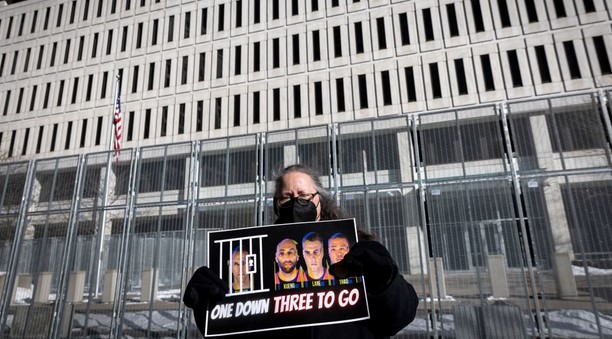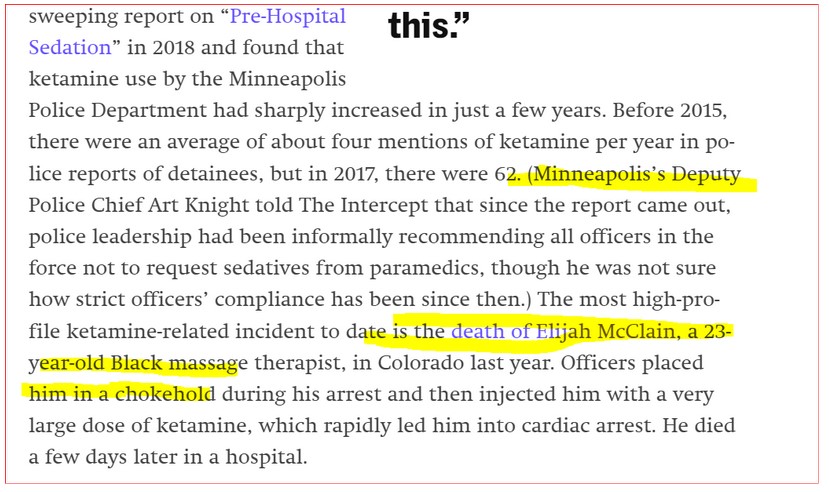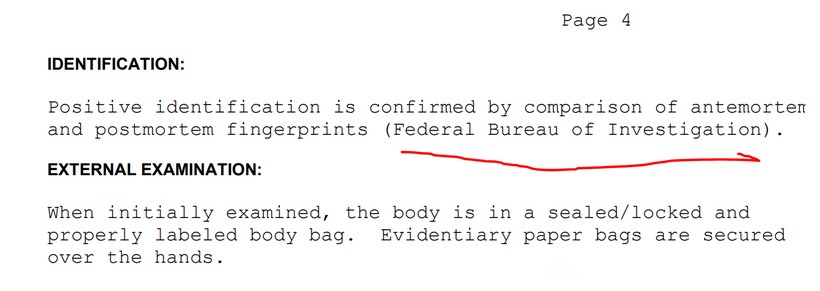Is vengeance the new form of justice?
The thing about corruption is that the more widespread it is, and the higher up it goes in the political establishment, the fewer people want to talk about it.
“Guilty Beyond A Reasonable Doubt?”
“While Chauvin knelt on Floyd’s neck, J. Alexander Kueng, a rookie cop, knelt on Floyd’s back. Another rookie, Thomas Lane, held his legs down. And a third officer, Tou Thao, kept bystanders back. None of them stepped in to stop the killing,” writes reporter Samantha Michaels.
Nearly two years later, the mainstream version of reality reads as though George Floyd was hunted down. Now, the three officers “willfully” deprived him of medical care and didn’t do enough to “stop the killing.”
The 10 minutes before Darnella Frazier pressed ‘record’ on her phone don’t factor into the courtroom, mainstream reports, or justice. George Floyd’s non-compliant “squirrelly” behavior doesn’t factor into the escalation.
Bystander Charles McMillian told George he “couldn’t win” while Floyd’s ex-girlfriend, convicted felon Shawanda Hill, even yelled, “stop resisting.” This was before Kueng and Lane walked Floyd across the street for Act Two.
Enter Derek and Darnella.
Without context, you have three men on one. No matter that the suspect was 6’6, 240 pounds, and illustrated superhuman strength while having an inexplicable freakout.
But now the officers had not done enough to save Floyd’s life.
Quite ironic given all the times I’ve heard someone say “I’m just doing my job” since this plandemic was officially announced two years ago. Seriously, how many failed to intervene, becoming accomplices of medical tyranny under the Rona Regime?
Please follow Maryam Henein on Twitter
You can support her work on Patreon
Follow Maryam on Telegram and Gab
According to extensive research by Professor Emeritus of Psychology and Founding Director Ervin Staub, there are many instances of good people not stepping in to stop bad things from happening.
For instance:
- Copilots who have failed to intervene, ultimately helping a pilot fly an airplane into the side of a mountain.
- Nurses in operating rooms failed to intervene when they knew the doctor was about to operate on the wrong patient or the wrong leg or the wrong organ.
I called this condition “Following-Gone-Fatal” – not to be mistaken with mass formation psychosis.
To address police officers who fail to intervene, Georgetown Law Professor Christy Lopez, who has investigated police misconduct, co-founded the Active Bystandership for Law Enforcement (ABLE). The program is actually a national hub for training, technical assistance, and research.
“We’ve been training departments large and small all across the country, to instill a culture of active bystandership,” says Lopez.
The future of policing encourages officers, including rookies, to “push back against their violent peers.” But how fair is it to damn rookies and punish them for following training now on the record as being inconsistent and confusing?
To intervene is a verb; it requires an act.
Recall for example that Thomas Lane twice suggested rolling him over. But “suggesting aid and actually rendering aid are very different things,” as noted by Nicole MacKenzie, the medical support coordinator who handles EMR training. She also conveniently sits in on scenario training.
Lane responded about “excited delirium,” to which Chauvin responded that the ambulance was coming.
“No, staying put where we got him,” Chauvin instructed.
“Would you expect my client to get up and kick Mr. Chauvin off, throw him off Mr. Floyd,” Earl Gray, Thomas Lane’s defense attorney, stated during the trial, “Is that your expectation?”
Sacrificing three men – two that hadn’t even closed out their first week on the job – for not intervening when they were following their ‘faulty’ training during an event that unfolded in a matter of minutes is absurd. Furthermore, it does nothing to absolve legit tragedies. Take 23-year-old black massage therapist Elijah McClain, who was injected in 2018 with ketamine “to gain compliance.” The sedation served as a kind of “excessive force.” He had a cardiac arrest and died days later.
Have you ever heard of him? How about his black life?
“Long Live George Floyd,” Morries Lester Hall told Law & Crime Network, following the Derek Chauvin verdict in April 2021.
Meanwhile, the faulty narrative long lived into the federal trial, even though racism was no longer part of the tale.
Wait, what? Wasn’t this the event responsible for manufacturing a race war and burning down the country?
Amazingly, this little change in the storyline was not a significant red flag.
Now, the focus had shifted to police brutality where none of the officers had stepped in to “stop the killing.” And, in a world where false narratives trump facts, that was that.
In October of 2021, the NCSL observed that in the subsequent 12 months after Floyd’s death, states enacted more police accountability legislation than ever before. Trends emerged that ranged from training and certification requirements to oversight and use-of-force regulation.
Since the George Floyd incident, more than 3,000 bills have been considered across all 50 states and in Washington, D.C. At least 17 states have created a statutory duty to intervene and/or a duty to report or document incidents. In fact, the death of George Floyd kicked off an unprecedented state legislative response, according to the National Conference of State Legislatures (NCSL).
“This might be a rare occasion where a criminal prosecution will have an inordinate impact on how officers think about their jobs and how agencies think about their responsibilities,” Lopez concluded.
Alas, the historical impact of United States Vs Tou Thao, et al has gone mostly unnoticed. It’s arguably the first criminal trial that involves the failure to intervene by officers who are of a lower rank than the officer they failed to intervene against. The most famous case involving a superior failing to intervene is Rodney King.
The George Floyd incident was helping usher in predictive policing and a Minority Report A.I. New World Order. And barely anyone paid any attention.
Saint Fentanyl Floyd — Drugs Galore To No More
“I ate too many drugs.”
During the Derek Chauvin trial, attorney Eric Nelson played a clip where George Floyd seems to say “I ate too many drugs” while he’s lying on the cement.
Thao heard him say that too.
I did as well.
It’s not uncommon for people to eat drugs before cops show up, Thao stated while on the stand.
But, unwittingly, it was determined to be an auditory illusion like Yanny or Laurel. Different people hear very different things.
On the stand, the Minnesota Bureau of Criminal Apprehension, Senior Special Agent James Reyerson, said he heard George say, “I ain’t do no drugs.”
In any case, that is a LIE. George Floyd had been on and off drugs and in and out of jail for the past 20 years. He had been in the hospital twice for near overdoses in March 2020 alone, according to his girlfriend Courtney Ross who attended the federal trial and shed many many tears and used many tissues.
Being a drug addict doesn’t justify death in any way; however, pretending Floyd was a Saint and likening him to Jesus Christ is a farce. And it made me wonder – why all the lies?
For the record, Floyd swallowed fake fentanyl, courtesy of the Mexican Cartel with ingredients made in China. Even the Drug Enforcement Agency (DEA), acknowledges that Mexico and China are the primary sources for the flow of fentanyl into the United States.
Fake fentanyl is ravishing Americans and killing more people than COVID-19. It was even described as a “national emergency.” Counterfeit pills parading as prescription drugs can contain fentanyl, a synthetic opioid that is fifty to one hundred times more potent than morphine and is often laced with other drugs.
If anyone truly cared about Floyd’s black life, why not look into the source of the drugs? Oh yeah, because they weren’t considered to be a significant factor.
But basically in truth, George Floyd swallowed street drugs with no quality control department.
“Swallowing a fake pill is like playing Russian Roulette with your life,” says Robert Arce, a retired Phoenix Police detective with 23 and a half years on the force and extensive experience working with Mexican organized crime and street gangs.
Interestingly, in May 2019 – exactly a year earlier – Floyd also swallowed pills, almost overdosed, and then ended up in the hospital. That time, authorities found 274 Oxy pills in his car.
The Mexican Cartel deals in fake Oxy, too, Arce told me. He suspected Floyd was likely “boosting” – selling drugs to support his habit. A lot of the Oxy looks like oxycodone pills but only contains fentanyl.
So in two incidents, the cops arrive and he swallows drugs? Like all pro career criminals, Floyd said he didn’t have his I.D. on him this May day in 2020. He did have a pipe in his pocket, which ex-officer Thomas Lane ultimately left on the roof of Squad 320. George verbally gave his name to ex-officer Alexander Kueng who wrote it in a notebook. (Cute. A real old-school moment right there.)
While George Floyd sat on the sidewalk propped against the outside of the restaurant Dragon Wok, Kueng handed Park police officer Peter Chang the note to run the name.
You can see Chang – off his body-worn camera footage – go into Squad 830 and type into the law enforcement data system. The footage shown at the Derek Chauvin trial cuts off. I guess nothing of interest came up? I’ve queried to acquire the unredacted exhibit.
Was it possible that nothing came up about Floyd being a felon? I asked a retired LAPD officer whether this was plausible. He informed me that authorities only look for outstanding warrants and unpaid tickets.
Strange, given that state, local, and national police have access to more than 20 databases that cover a person’s criminal history and his or her interactions with a state.
So at what point did they really know they had a criminal on their hands with a long rap sheet? Usually, it is the medical examiner who alerts the next of kin. But in this case, it was the FBI.
So okay … no one knew of George Floyd’s criminal background on the scene, except arguably for co-worker Derek Chauvin, who also worked at the same Mexican Cartel nightclub El Nuevo Rodeo. But, of course, that detail was massaged into oblivion.
Now, the illicit drugs in his system, including meth and fentanyl, were inconsequential.
The drugs swallowed were not determined as “top line” causes of his death, Now, Floyd did not die from a drug overdose. No matter that medical examiner Andrew Baker initially said, “If he were found dead at home alone and with no other supporting causes, this could be acceptable to call an O.D. Deaths have been certified with levels of 3.” Now, he also did not die of a heart attack. Two plus two equals five.
It was a lack of oxygen because he was suffocated. Who cares that Baker was coerced into saying there was “neck compression?”
There was no physical evidence, but no matter. Apparently, you can impede one’s airway without even bruising.
Excited Delirium — Is It A Real Condition?
“I’m worried about Excited Delirium,” Thomas Lane stated to Derek Chauvin on May 25th, 2020.
The three officers stated that Floyd was exhibiting traits of Excited Delirium. Excited Delirium (ExDS) is a controversial condition that officers are trained to identify in the academy with a two-hour PowerPoint presentation.
Symptoms include acting irrationally and somewhat incoherently, alongside psycho-motor agitation – a lot of movement, very sweaty, and often combative. No two people exhibit the exact same symptoms of Excited Delirium. Officers need to know common symptoms so they can identify when it’s happening.
If you watch the city’s surveillance video, you will see that George Floyd was shaking the entire squad car by himself as the cops ran over to the passenger side.
Thao observed that “he was fighting off three officers consistent with superhuman strength” and “very sweaty.”
According to Darnella Frazier’s footage, we are led to believe the cops were the reason George Floyd’s nose was bleeding. But, in fact, he banged his face against the plexiglass partition. Twice.
Kueng took the repeated action to be a sign of Excited Delirium. “It was a possibility, ma’am. I didn’t want to rule it out because he did do it twice,” Kueng said to the prosecution.
MacKenzie maintained she saw no efforts to put Floyd in the side recovery position, calling it inconsistent with MPD policy and training.
During the trial, Tou Thao’s attorney, Robert M. Paule, zoomed in on an image from the “Excited Delirium Syndrome” PowerPoint presentation. The image showed an officer’s knee on a subject’s upper shoulders and neck.
He asks MacKenzie, “Would it appear that the knee is on that person’s neck?”
It was.
If this was a False Flag, it was designed as to be a Gordian Knot.
Watch the George Floyd trailer.
Part 3 – TBC
Maryam Henein is an investigative journalist, founder, and editor-in-chief of HoneyColony. She is also the director of the award-winning documentary film Vanishing of the Bees, narrated by Elliot Page. Follow her on Gab:@ladybee. Email her: maryam@honeycolony.com.
Please support Maryam Henein in her efforts to publish a book and short documentary: regarding the truth about George Floyd.
You can read Maryam Henein’s full article archive HERE.
Three Officers Guilty On All Counts: Excited Delirium — Is It Really A Thing? Part 2


